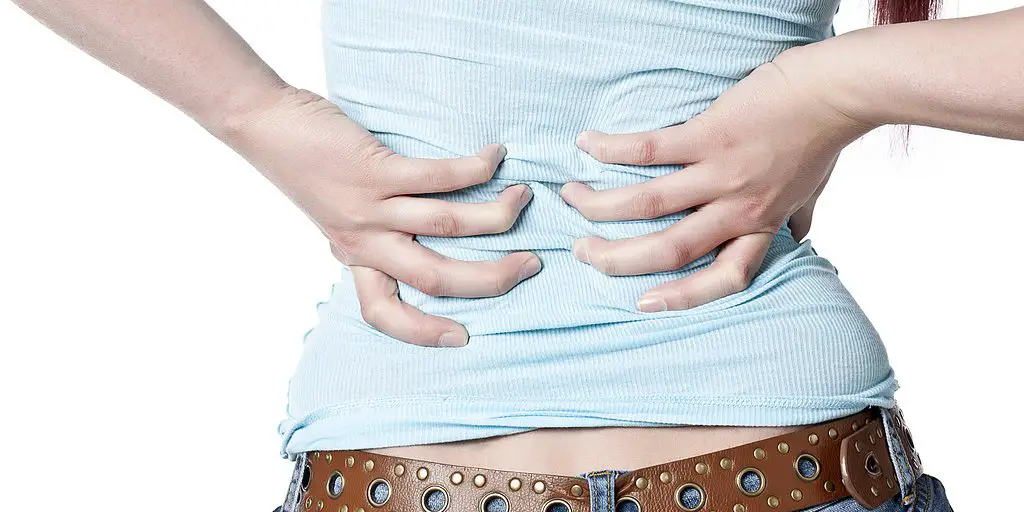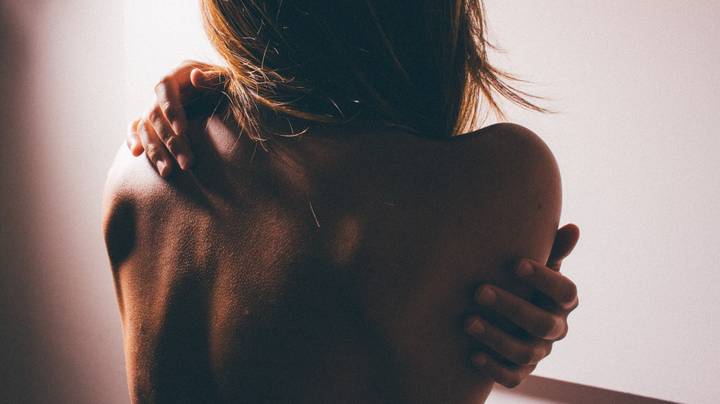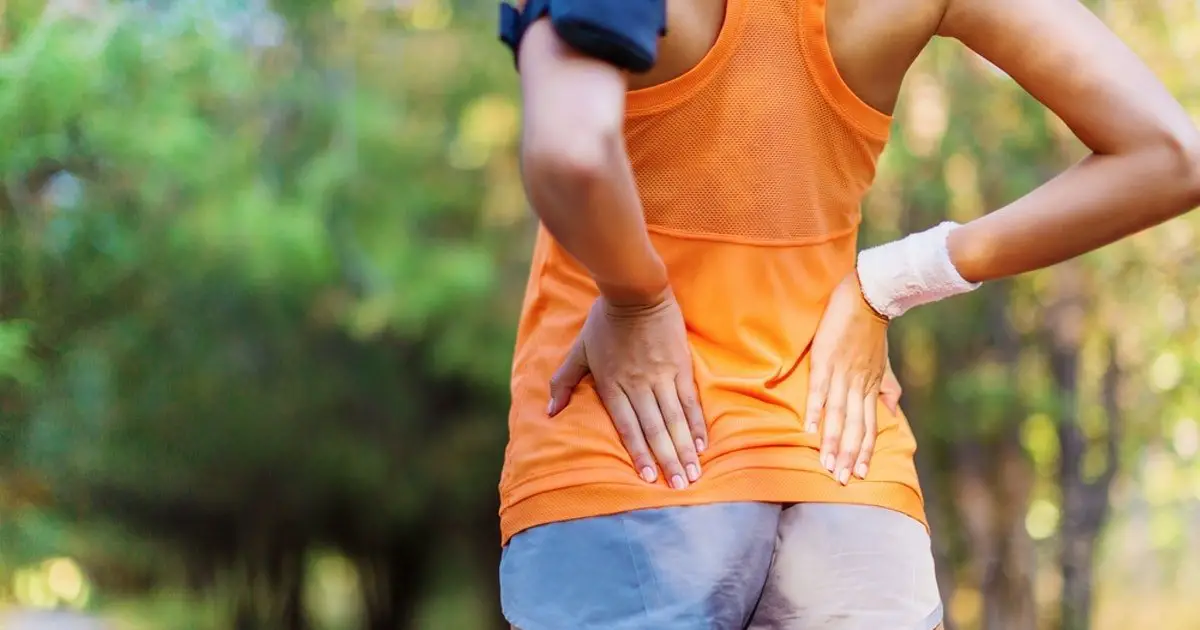Severe Lower Back Pain During Period
Lower back pain is a common symptom of premenstrual syndrome, which affects the majority of women during their periods. It isnt usually serious, however, if you have an underlying condition, such as dysmenorrhea, endometriosis, fibroids or premenstrual dysphoric disorder, you may develop severe lower back pain during your periods.
The Question: I Have My Period And My Back Hurts Why Also Ow
We’re just going to say it: periods aren’t fun.
It’s understandable if you just want to crawl into bed and never come out during that time of the month. Especially when body aches — particularly the lower back pain — kick in.
And, really, what’s the deal with that? Why is your back throbbing when your uterus is the one doing all the work?
Let’s break it down.
First of all, nothing’s wrong with you. Lower back pain during your period is totally common. It’s caused by contractions in the uterus, which radiate through the web of nerves within your pelvic region. As your body contracts to rid itself of the uterine lining, it can sometimes press on blood vessels in the area, limiting or cutting off the supply of oxygen to the nearby muscles.
“Many women get back pain during their periods,” Dr. Houman Danesh, director of integrative pain management at Mount Sinai Hospital in New York City, told The Huffington Post. “This pain is from the uterus contracting to shed the lining which has built up since the last cycle… The phenomenon is described as ‘referred pain.'”
“Referred pain” is pain felt in a part of the body other than its actual source. If you’re just about to get your period, your uterus might be contracting in preparation for the upcoming activity. This is totally common and normal, and the pain can affect your thighs as well as your lower back.
Have a question for Healthy Living? Get in touch here and we’ll do our best to ask the experts and get back to you.
Why Do I Have Cramps But No Period
Pelvic pain similar to a menstrual period can happen at times when no period is due or can occur because of conditions other than the monthly cycle. Sometimes it is hard to tell the exact reason for cramps that feel like a menstrual period.
The following diseases and conditions are examples of situations that can cause pain or cramps when not on your period.
Recommended Reading: Advil Or Aleve For Back Pain
However Your Back Pain Should Not Be So Severe That You’re Having Trouble Standing Or Sitting
Nor should the pain feel like stabs or shooting sparks. At the very most, your back pain should be a mild, consistent type of soreness that you can recognize and attribute to menstruation.
If the pain is more severe, this could be a sign that you have endometriosis, a condition in which endometrial tissue is growing in different places, like the outside of your uterus. This disorder is incredibly painful and debilitating, so you should see a doctor immediately if the back pain feels like it’s interfering with your daily life.
But if you’re just dealing with the standard back pain BS, don’t stress too much over it. It is, unfortunately, a standard and expected side effect of being a woman.
Lower Back Pain During Your Period: Causes Diagnosis And Treatment

Many people experience bloating, headaches, and abdominal pain during their period. Another common symptom that people experience during their period is lower back pain. This pain often occurs as part of premenstrual syndrome . Less commonly, it can occur as a result of diseases such as endometriosis.
Back pain caused by your period may range from mild discomfort to debilitating pain that interferes with daily activities. Back pain associated with your period can start a few days before it starts and get better after your period is over. This type of back pain is typically muscular and caused by hormonal changes. Lets discuss how to manage lower back pain before, during, and after your period.
Read Also: Ibuprofen For Back Pain Dosage
How Do You Know Which Type You Have
Primary dysmenorrhoea is much more common than secondary dysmenorrhoea. However, because the period pain of secondary dysmenorrhoea can be severe and linked with serious health conditions, it’s important to be aware of what’s ‘normal’ and what’s not when it comes to period pain.
It’s also important to know when it’s okay to manage the pain on your own, and when it’s better to reach out for extra help.
How Common Is Period Pain
The medical term for period pain is dysmenorrhoea and it’s a condition that many women are familiar with.
The research on just how many women have painful periods varies but, in a 2012 study from Italy, 84% of young women experienced period pain.
In an Australian study of female high school students, it affected 93%.
Also Check: Aleve Or Advil For Back Pain
Period Back Pain Causes And Remedies
You dont need a doctor to explain how bad menstrual back pain can be . When your back hurts so much that you feel like you can hardly walk, you know the pain all too well. Back pain or pelvic pain is a common symptom of your period.
Different women experience pain, especially period pain, in varying ways. But hopefully your back period pain is not severe enough to interfere greatly with your life. How do you know what pain is normal, and when you should call the doctor?
Read on to learn more about the causes of back pain during menstruation and what you can do to relieve your symptoms.
How Can I Treat Period Back Pain
If you have primary dysmenorrhea and a surge in prostaglandins at the beginning of your period is the problem, taking a prostaglandin inhibitor like ibuprofen should help in many cases, Dr. Masterson says. If heavy periods are the main issue, whether thats due to endometriosis, PCOS, or your normal cycle, hormonal birth control pills or injections containing the hormone progesterone can help decrease bleeding, she adds.
There are other medical interventions for moderate low back pain physical or chiropractic therapy, massage, and acupuncture may provide relief, Dr. Missmer says. If the pain is chronic and severe, meaning it’s interfering with your ability to attend, work, school, or your regular activities, its important to consult a gynecologic pelvic pain specialist to work through the pain, she says.
Surgical treatments may be a *last resort* for second dysmenorrhea some options include a myomectomy, which can remove uterine fibroids, an endometrial ablation, to remove the uterine lining and basically stop menstrual flow, or a hysterectomy, to remove the uterus altogether.
Read Also: Aleve Or Advil For Lower Back Pain
How Can You Relieve Mild Menstrual Cramps
To relieve mild menstrual cramps:
- For the best relief, take ibuprofen as soon as bleeding or cramping starts. Ibuprofen belongs to a class of drugs called non-steroidal anti-inflammatory drugs . They reduce the output of prostaglandins. If you cant take NSAIDs, you can take another pain reliever like acetaminophen.
- Place a heating pad or hot water bottle on your lower back or abdomen.
- Rest when needed.
- Avoid foods that contain caffeine.
- Avoid smoking and drinking alcohol.
- Massage your lower back and abdomen.
Women who exercise regularly often have less menstrual pain. To help prevent cramps, make exercise a part of your weekly routine.
If these steps dont relieve pain, your healthcare provider can order medications for you, including ibuprofen or another anti-inflammatory medication in a higher dose that is available over the counter. Your healthcare provider might also suggest oral contraceptives since women who take oral contraceptives tend to have less menstrual pain.
If testing shows that you have secondary dysmenorrhea, your provider will discuss treatments of the condition causing the pain. This might mean oral contraceptives, other types of medications, or surgery.
Is This Pain Ever A Problem
Its normal to have back pain during your period. However, if pain or severe cramps show up out of nowhere, you might want to visit your doctor. There may be underlying problems that are causing the back pain, and not necessarily your menstrual cycle itself. Some examples of a secondary cause is endometriosis and fibroids.
Your back pain may be a cause for concern if:
-
You’ve started having back pain during your period, but you never used to
-
The pain is constant throughout your menstrual cycle
-
The pain is severe
You May Like: Does Motrin Help With Back Pain
When Should I Call My Doctor
Mild backaches, especially in the first day or two of your period, arent much cause for concern.
But if your pain is preventing you from doing your normal activities or if it drags on for more than 3 days, contact a doctor. An underlying condition or muscle issue could be causing the pain.
If youre having other symptoms, let the doctor know. Symptoms like these could indicate a more serious condition:
- Youre soaking through one or more pads or tampons every hour.
Its Time To Visit A Chiropractor

If you or someone you know experiences painful lower back pain related to their period, its time to explore chiropractic care treatment!
After conducting a thorough assessment, a chiropractor can identify problem areas within the lower back and spine that contribute to worsening period pain. Through spinal manipulation and mobilization, the chiropractor can help restore proper spinal joint motion and function. This in turn can help release muscles and nerves within the lower back, reduce chronic inflammation, and help remove period-related lower back pain.
There is no need to suffer through period-related lower back pain every month! For more information about chiropractic care and menstrual lower back pain treatment, please visit siragusochiropractic.net
Recommended Reading: Mayo Clinic Low Back Pain Exercises
How To Manage Severe Lower Back Pain During Your Period
The following may be able to help with severe lower back pain during your period:
- Pain medication Taking over-the-counter pain medication or anti-inflammatories a few days before your period may alleviate lower back pain. If your pain doesnt get better with over-the-counter pain medication, consult your health care provider.
Some of these methods may also ease abdominal cramps, which commonly affect lower back pain:
- Heat Applying a warm water bottle or heating pad on the lower back may help reduce back pain during your period.
- Warm shower or bath Taking a warm shower or bath may help you relax and relieve back pain during your period.
- Massage Gently massaging the abdomen and lower back may also relieve back pain.
- Exercise Regular physical activity may help with the pain during your period. Although its easy to be tempted to avoid exercising during your period, physical activity can help reduce lower back pain. Try gentle exercises such as walking, cycling, and swimming. You can talk to a health care provider to determine what physical activity is best for you.
- Relaxation techniques Relaxation activities such as meditation may help distract you from feelings of discomfort and pain.
Some lifestyle changes may also affect pain during your period.
- Maintain a healthy diet and talk to a health care provider about taking nutritional supplements with vitamin B and magnesium.
Herniated Disk In The Lower Back
The backbone, or spine, is made up of 26 bones called vertebrae. In between the bones are soft disks filled with a jelly-like substance. These disks cushion the vertebrae and keep them in place. Although people talk about a slipped disk, nothing actually slips out of place. The outer shell of the disk ruptures, and the jelly-like substance bulges out. It may be pressing on a nerve, which is what causes the pain.A slipped disk is more likely to happen due to strain on the back, such as during heavy lifting, and older individuals are at higher risk.
Rarity: Common
Top Symptoms: lower back pain, moderate back pain, back pain that shoots down the leg, back pain that gets worse when sitting, leg weakness
Urgency: Primary care doctor
Recommended Reading: Aleve Good For Back Pain
How Does Secondary Dysmenorrhea Cause Menstrual Cramps
Menstrual pain from secondary dysmenorrhea is a result of problems with the reproductive organs. Conditions that can cause cramping include:
- Endometriosis: A condition in which the tissue lining the uterus is found outside of the uterus. Because these pieces of tissue bleed during your period, they can cause swelling, scarring and pain.
- Adenomyosis: A condition where the lining of the uterus grows into the muscle of the uterus. This condition can cause the uterus to get much bigger than it should be, along with abnormal bleeding and pain.
- Pelvic inflammatory disease : An infection caused by bacteria that starts in the uterus and can spread to other reproductive organs. PID can cause pain in the stomach or pain during sex.
- Cervical stenosis: Narrowing of the cervix, or the opening to the uterus.
- Fibroids : Growths on the inside, outside or in the walls of the uterus
Treatment For Primary Dysmenorrhoea
Women with dysmenorrhoea need a thorough medical examination to make sure their period pain is not caused by certain reproductive disorders such as endometriosis or fibroids. Treatment options for dysmenorrhoea can include:
- pain-relieving medication, such as paracetamol
- medication that inhibits prostaglandins, such as ibuprofen or other anti-inflammatory medication
- regular exercise and attention to overall physical fitness
- applying heat, such as a hot water bottle, to the abdomen
- relaxation techniques
- the oral combined contraceptive pill, which reduces prostaglandins and therefore reduces pain
- bed rest during the first day or so of the period.
You May Like: Back Pain Cleveland Clinic
A Womans Menstrual Cycle Consists Of Various Stages Including:
Pre Menstrual: A timeframe of about 2-3 weeks prior to the shedding of the uterine lining.
Stage 1: Follicular stage the stage in which excessive amounts of estrogen are produced and the uterine lining thickens.
Stage 2: Luteal stage the stage in which the production of estrogen drops off and progesterone takes off. This is the stage in which ovulation occurs.
Period: Shedding of uterine lining, blood and excess tissue.
Post Menstrual: A timeframe of about 1-2 weeks after bleeding stops.
Symptoms During Menstrual Cycle
In addition to this back pain due to the menstrual cycle there are several other symptoms that may appear at the same time. These might include the abdominal cramps we mentioned previously, headaches, bloating, fatigue, nausea, mood swings and digestive issues. All of these other symptoms might be present along with period back pain.
Causes of Menstrual Back Pain
There could be three reasons for back pain during the womans menstrual cycle. This includes:
Dysmenorrhea: When the uterus contracts sharply the result is cramping whether it be in the abdomen, upper thighs or back. This is one of the leading causes of back pain during the menstrual cycle. Stress, lack of exercise, and anxiety can cause dysmenorrhea. There is even a chance that you can have back pain but no period if taking birth control pills that prevent ovulation. This back pain starts low and can move to any other part of the back and can even cause Sciatica if it is really severe.
What Are Some Tricks I Can Use At Home For Period Back Pain
In many cases, you can treat your typical monthly period back pain with home remedies. Here are some expert-recommended tips to soothe your back aches during that time of the month.
Also Check: Will Aleve Help Back Pain
How Is Dysmenorrhea Treated
Specific treatment for dysmenorrhea will be determined by your health care provider based on:
-
Your age, overall health, and medical history
-
Extent of the condition
-
Cause of the condition
-
Your tolerance for specific medications, procedures, or therapies
-
Expectations for the course of the condition
-
Your opinion or preference
Treatment to manage dysmenorrhea symptoms may include:
-
Prostaglandin inhibitors, such as nonsteroidal anti-inflammatory medications, or NSAIDs, such as aspirin and ibuprofen
-
Acetaminophen
-
Diet changes
-
Vitamin supplements
-
Heating pad across the abdomen
-
Hot bath or shower
-
Endometrial ablation
-
Endometrial resection .
-
Hysterectomy
Why Do Some People Get Back Pain Around Their Period

Typically, if youre going to experience period back pain, its within the first six days of your cycle, Dr. Missmer says. The back discomfort is usually associated with primary dysmenorrhea, a medical term to describe cramps or pelvic pain that come along with your period each month. Over 80 percent of people who menstruate likely have some kind of primary dysmenorrhea during their periods.
Period back pain likely has to do with changes in prostaglandins, which are hormones that cause the uterus to contract during your period in order to shed its liningand that added pressure can also contribute to pelvic and back pain, says Lisa Masterson, MD, ob-gyn and founder of Ocean Oasis Day Spa in Santa Monica, California. Dysmenorrhea can be mild and easily cured by popping an over-the-counter pain reliever, or the pain can be severe enough where its difficult to function.
In some cases, back pain may happen before your period actually does, but its less common. PMS symptoms are more commonly breast tenderness, bloating, irritability, and headaches, explains Dr. Masterson. Symptoms of premenstrual dypshoric disorder can include physical pain like cramps and back aches. But PMDD more often impacts mental health, causing crippling depression, mood swings, and brain fog.
Recommended Reading: Will Naproxen Help Back Pain